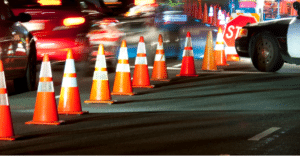You won’t find the police rounding up people at concerts, sporting events, or places of worship and searching them to see if anyone is breaking the law. That would be unconstitutional. But, with some limitations, police can set up roadblocks to determine if drivers are driving under the influence (DUI). If you are arrested because of a stop at a “sobriety checkpoint,” you may have valid defenses if it was not carried out correctly.
Police in Colorado and other states can have DUI checkpoints to see if drivers are impaired by alcohol and/or drugs. They are more common around holidays when more drivers are intoxicated, like around Christmas and New Year’s Eve. If they find contraband in the car, like drugs, or you illegally possess a firearm, that can be added to the charges.
Depending on the Circumstances, Probable Cause May or May Not Be Needed to Stop Your Vehicle
Usually, police need to have probable cause that you broke, or are breaking, the law before pulling you over. This could be speeding, running a stop sign, or showing signs you are intoxicated (weaving in and out of lanes, speeding up then slowing down).
However, thanks to a 1990 United States Supreme Court case stating that these checkpoints are constitutional (with conditions) because intoxicated driving is a significant threat to public safety, the probable cause rule does not apply to roadblocks.
Checkpoints Must Obey Rules or Charges Can Be Dismissed
Some of the limits spelled out by the Colorado Department of Transportation Guidelines for Sobriety Checkpoints include:
- The area must be safe
- The stop poses only a minor inconvenience to drivers
- The procedures used to decide which cars to stop are non-discriminatory
- The checkpoint is publicly announced in advance
- Drivers can avoid the checkpoint (though you can be stopped if you break the law when doing so)
Everyone, including police officers, must follow the rules, and sometimes they make mistakes.
What May Happen If You’re Stopped at a Checkpoint
If you drive up to a checkpoint and are stopped, what happens next may vary. The officer will ask that you roll down your window and may engage in a conversation. If you don’t smell of alcohol or marijuana and there are no open containers, drugs, or anything illegal in sight, the officer may not bother to inquire any further.
The officer may also treat this as if you were pulled over while driving. You may be asked for your driver’s license, registration, and proof of insurance (which you must provide). If there’s something the officer witnesses, you may be asked to take a sobriety test:
- There are open beer cans, a partially empty liquor bottle, marijuana joints, or pills visible
- You smell of alcohol or burned pot
- You sound or act like you are intoxicated: you are aggravated, aggressive, way too happy given the circumstances, or your speech is slurred
- Your eyes are bloodshot
- You have a hard time controlling your hands or are fumbling to hold onto something
- You admit to drinking or using drugs before or while you drove
If you are arrested at a checkpoint that was not properly conducted, or the officer arresting you violated your rights, you may have valid defenses that can result in charges being reduced, dropped, or dismissed after a trial. You are innocent until proven guilty, and the prosecution has the burden of proof, not you.
If you are arrested for DUI, talk to a defense attorney right away to learn about your rights and the most effective ways to defend them, your freedom, and your future. Contact us today to schedule a consultation.
